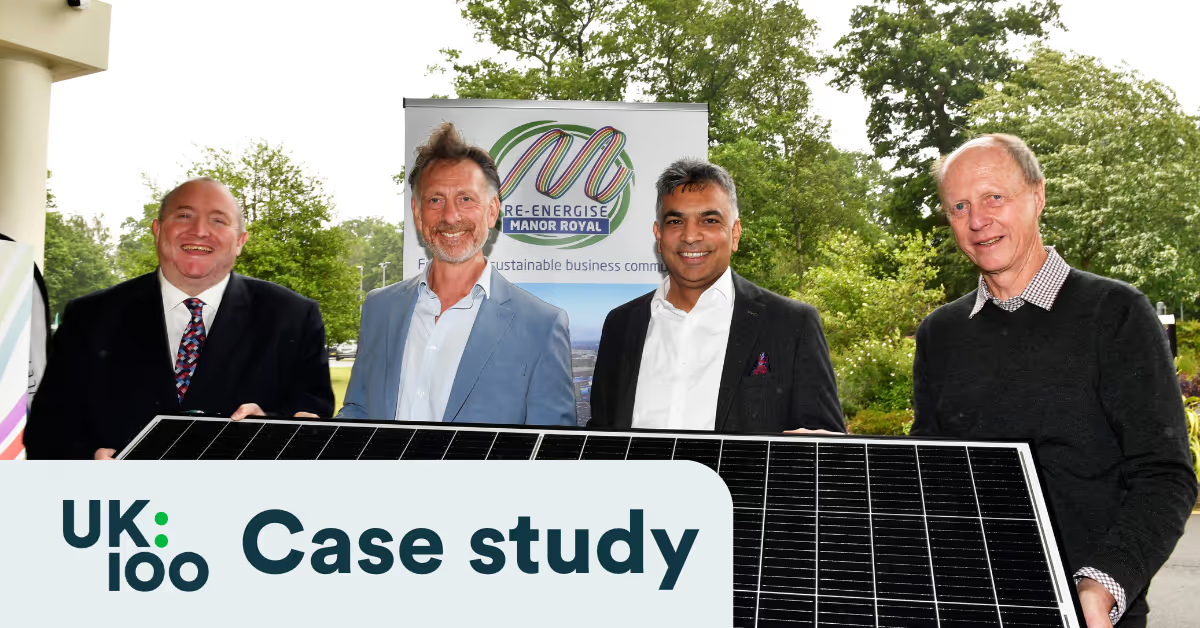How Local Authorities Can Access Upcoming Opportunities from GB Energy

.svg)
How can local authorities make the most of GB Energy? It’s a question we’ve heard from council officers and elected climate leaders in recent weeks. Designed to transform how the UK generates and benefits from clean energy, GB Energy is central to the government’s plans to accelerate the energy transition and deliver tangible local benefits. Local authorities are keen to understand what opportunities are available to drive local climate action and create community value.
The national picture so far
GB Energy is a new publicly-owned company established to accelerate clean power investment. It has been allocated £8.3 billion over the course of this Parliament to accelerate the UK’s transition to clean energy. Partnering with local authorities and community energy organisations, the programme will fund and deliver small to medium renewable projects generating up to 8 GW of clean, affordable power.
GB Energy’s statement of strategic priorities is built around two core objectives: the rapid deployment of clean energy and ensuring the fair distribution of benefits. As both a developer and investor, it will co-develop projects alongside local government, community organisations, and the private sector to unlock investment in solar, onshore wind, and emerging technologies. Importantly, GB Energy will help ensure the energy transition benefits the public by expanding community ownership of renewables to lower energy bills, create local green jobs, stimulate local economies, and reinvest returns into new projects for the public good.
What our members are saying
At UK100’s Policy Advisory Group meeting in September (a group of officers, leaders and cabinet members from paid UK100 members), we discussed GB Energy’s emerging plans and what they mean for local government.
Councils expressed strong enthusiasm for working with GB Energy, seeing clear potential to accelerate local renewable generation, support green jobs, and reduce energy costs. However, to ensure GB Energy succeeds in its mission, they want it to tackle the following challenges:
- Grid connection constraints, with long delays, high costs, and uncertainty holding back both council-led and community renewable projects.
- Limited local capacity and short-term, limited funding, which hinder the delivery of community energy initiatives and provide funding only for Mayor Combined Authorities, not local authorities across the UK.
- Regulatory barriers, particularly around grid access and local energy supply, which currently limit the feasibility of community-owned renewable projects.
- Project complexity and reinventing the wheel: Each local authority or community organisation is often forced to start from scratch in areas such as procurement, planning, ecological assessment, or contracting. Without a central repository of best practice, time and resources are wasted and progress slowed.
Local opportunities emerging: The Local Power Plan
For local government and UK100 members, one of the most significant developments will be the forthcoming Local Power Plan, expected to be published later this year. Developed jointly by GB Energy and DESNZ, the Local Power Plan will set out how GB Energy intends to work with local authorities and others and will be a central component of GB Energy’s strategy to expand community renewable energy. Its vision includes:
- Supporting up to 8 GW of small and medium-scale community renewable projects, delivering cheaper, cleaner power.
- Providing financial support for local government, including grants, loans, and equity partnerships, to unlock investment and scale up delivery for community renewable energy projects.
- Offer technical and commercial support to councils through a specialist advisory service to build local capacity.
- Encouraging shared ownership models so communities can directly benefit from locally generated renewable energy.
- Aligning investment with the needs and priorities of local communities and ending the short term competitive funding models that have damaged the community energy sector.
Alongside this, DESNZ will work to remove policy and regulatory barriers such as grid access and supply restrictions, ensuring community-owned renewable projects are practical and feasible.
The principle is clear: local investment should be driven by local priorities. By combining financial support, technical expertise, and regulatory reform, GB Energy and DESNZ must fully empower councils to play a leading role in the clean energy transition and UK100 is ready to play its part in making this happen. Local authorities are also ready for that conversation and want to know more.
Key asks from our members and early recommendations from UK100
Members of our Policy Advisory Group have highlighted a set of key asks that will help support local authorities to deliver small to medium community renewable energy projects at pace and scale:
- Clarify GB Energy’s scope and relationship with other national institutions and programmes, ensuring a joined-up approach with initiatives such as the Warm Homes Plan.
- Prioritise grid connection reform.
- De-risk projects to unlock private finance, particularly for schemes with high social value and strong local economic benefits.
- Develop standardised templates and shared resources for procurement, contracting and ecological assessment.
- Provide dedicated capacity support for local authorities and community energy organisations.
Looking ahead
At UK100, we’re excited to be invited by GB Energy to join their Stakeholder Advisory Group so we can work together to ensure recommendations from local governments shape their work, including the Local Power Plan, and support councils as they prepare for upcoming funding and project opportunities. This will be essential to scaling community-owned renewable energy, reducing energy bills, and creating equitable green jobs that build local wealth across the UK.
As more details emerge, UK100 will publish updates and practical resources to help members understand how to work with GB Energy and participate, collaborate, and unlock the benefits of the Local Power Plan, but if you have any questions in the meantime do get in touch at membership@uk100.org.
.svg)


.png)




